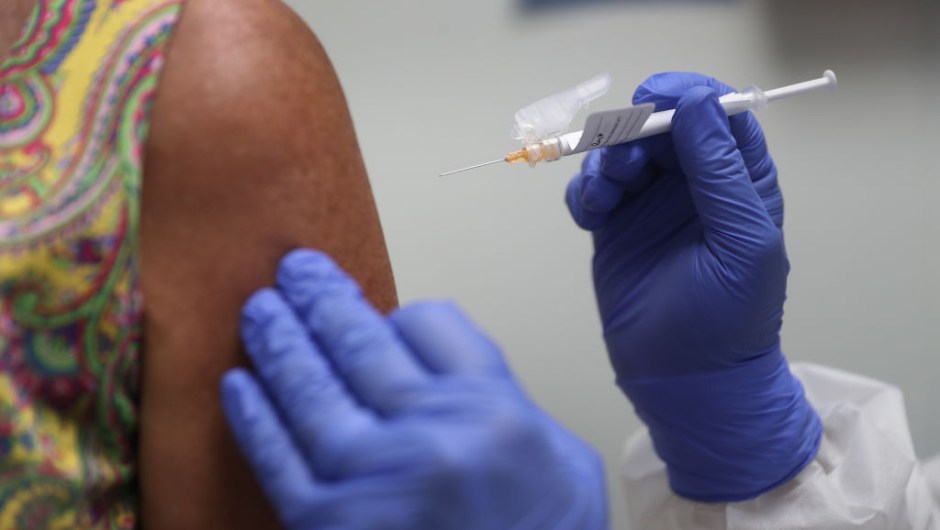Credit: Joe Raedle / Getty Images
(CNN Spanish) -
Several vaccines against the new coronavirus that are already in phase 3. Among them is the BRACE study carried out at the Murdoch Institute of Australia.
There they test whether an old BCG vaccine could help in the fight against covid-19.
Dr. Elmer Huerta explains how that vaccine could help fight this deadly infection.
You can listen to this episode on Apple Podcasts, Spotify, or your favorite podcast platform, or read the transcript below.
Hello, I am Dr. Elmer Huerta and this is your daily dose of information about the new coronavirus, information that we hope will be useful to take care of your health and that of your family.
At the time of writing this episode, according to The New York Times, there are already ten vaccines that are in phase 3.
When reviewing them, there was one that caught my attention.
It is the BRACE study, which is being carried out at the Murdoch Institute in Australia.
This study is testing the usefulness of the old BCG vaccine in preventing infection with the new coronavirus.
Today we will see how that ancient vaccine against tuberculosis can help in the fight against covid-19.
How the tuberculosis vaccine was created
Remember that tuberculosis is a disease caused by a bacterium called Koch's bacillus.
Like the virus that causes covid-19, this bacterium is very easily spread through the respiratory tract.
Tuberculosis can cause disease anywhere in the body, although the infection is most common in the lungs.
Unlike covid-19, which is a viral disease, tuberculosis does have a curative treatment that consists of a combination of antibiotics that can cure the disease in six months.
Following the working model of variolization, which we described in the September 14 episode, in which the cowpox virus was shown to protect against human smallpox, French scientists Albert Calmette and Camille Guérin thought that the bacteria that cause tuberculosis in cows could also prevent human tuberculosis.
For this, with enormous patience, they cultivated and re-cultivated the cow tuberculosis bacteria every three weeks so that it loses its ability to cause disease.
What they verified by injecting the bacteria grown in laboratory animals.
Approved against tuberculosis
After 13 years of work and 230 cultures and experiments, Calmette and Guérin finally produced a strain of cow tuberculosis bacteria that was no longer capable of producing disease.
And they proposed using it as a vaccine in humans to protect them from human tuberculosis.
Initial experiments paid off, and the BCG vaccine (which stands for Bacillus Calmette-Guérin) was first used in humans in 1921.
Over the next three years (through July 1924) 317 children were vaccinated in Paris.
Finally, at the League of Nations Conference in Paris in 1928 (the predecessor to the United Nations), the vaccine was recognized as safe and its use was encouraged.
Since that time, the BCG vaccine has been used in almost all countries of the world with a high prevalence of tuberculosis, to prevent severe tuberculosis.
It is given to newborns by injection.
The benefits of the BCG vaccine
The point is that - somehow not yet well understood - the BCG vaccine is considered to stimulate the human immune system.
For this reason, for many years it has been used in the treatment of superficial bladder cancer with very good results.
Fueling that idea of protection that the BCG vaccine would give, research in Guinea-Bissau has suggested that children vaccinated with BCG have fewer respiratory infections and deaths than non-vaccinated children.
And studies in Spain have shown that hospitalizations for respiratory infections in children aged 0 to 14 years not attributed to tuberculosis were significantly lower in BCG-vaccinated children compared to non-vaccinated children.
These and other studies have then led to the proposal of research protocols - one of which is the Australian Murdoch Institute study - to administer the BCG vaccine to a group of people.
This group would be compared with another that has not received the vaccine, with the aim of seeing if those vaccinated are infected less and therefore develop fewer complications from covid-19.
More tests will be done
In addition to the study in Australia, researchers from Texas A&M University, Baylor College of Medicine, the University of Texas MD Anderson Cancer Center, Harvard School of Public Health, and Cedars Sinai Medical Center are recruiting in the United States. 1,800 healthcare workers, people on the front lines fighting the virus, to be vaccinated with BCG.
Only time will tell if this ancient vaccine - the oldest vaccine in its original form - is capable of preventing infection by the new coronavirus and preventing complications and deaths in people at risk.
Send me your questions on Twitter, we will try to answer them in our next episodes.
You can find me at @Drhuerta.
If you think this podcast is helpful, help others find it by rating and reviewing it on your favorite podcast app.
We will be back tomorrow so be sure to subscribe to get the latest episode on your account.
And for the most up-to-date information, you can always head to CNNEspanol.com.
Thanks for your attention.
If you have any questions you can send them to Dr. Elmer Huerta via Twitter. You can also head over to CNNE.com/coronaviruspodcast for all episodes of our “Coronavirus: Reality vs. Reality” podcast. fiction".
Covid-19 Tuberculosis Vaccine














